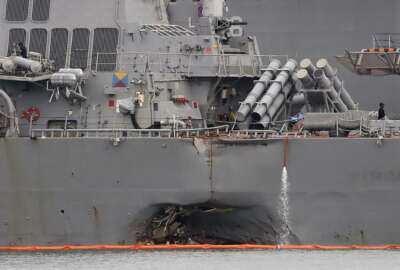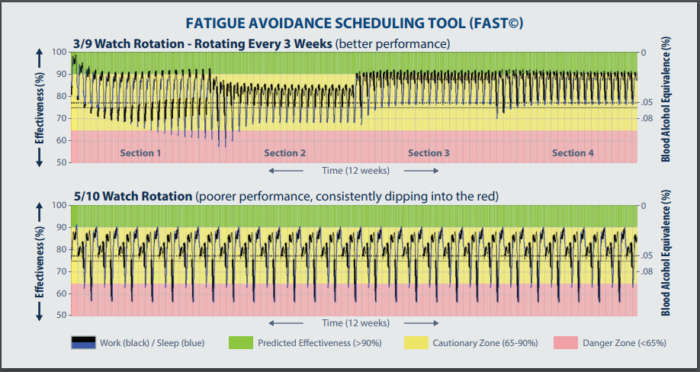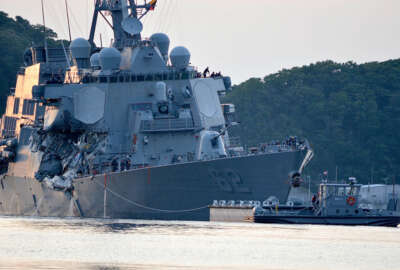
Navy wants sailors to have sweet dreams for safety’s sake
The Navy is implementing new guidance to require protected sleep hours for sailors on ships.
The Navy is taking steps to protect sailors’ sleep while they are on ships, after a series of deadly collisions rocked the service this year.
Effective by Dec. 20, most ships will have to move into what is called a circadian rotation. The rotations schedule watch and work shifts at routine times and create protected sleep hours for sailors on ships.
The guidance, signed by Vice Adm. Thomas Rowden, the Navy Surface Forces commander, gives ships a number of schedules they can follow to reduce sailor fatigue.
“Research has shown that 21 hours without sleep results in a degree of impairment equivalent to a blood alcohol content of 0.08 — legally drunk. You would not operate your car under these conditions; we should not ask our crews to stand watch and operate shipboard systems in a similar mental and physical state,” the Sept. 21 implementation guidance stated. “Used together, circadian rhythm watchbills and shipboard routines combat fatigue. They provide our sailors with a predictable watch rotation and protected sleep periods that recognize the human circadian rhythm.”
Some ships will not follow the protocol due to the nature of their mission.
The announcement comes one day after Navy Secretary Richard Spencer told reporters the Navy needed to change the work demands it was putting on sailors.
Spencer said the Navy has to set a maximum number of hours people can work, especially after some reports of submarine and ship crews working 100-hour weeks.
“I have asked [the Government Accountability Office] what is in the 100 hours, because I’ve heard bathing is in it, eating is in it. Someone does not have a rust pick in their hand for 100 hours during the week. I just want to make sure we are all on the same taxonomy about the 100 hours, but that being said yes, we owe it to them. What’s the difference between someone on a bridge or someone in the engine room or someone doing any one of their jobs any different than a pilot flying a plane? I don’t see any difference at all,” Spencer said.
The Navy’s demands on ship crews have been a controversial issue as of late.
Concerns over sailor fatigue are reflected in a 2006 National Institutes of Health study, which found erratic sleep patterns hurt sleep quality.
“Objective sleep quality was significantly compromised in rotaters compared to both day workers and fixed watch keepers, the most striking comparisons being sleep efficiency,” the study stated.
The Navy handbook on circadian rhythm says regular schedules improve “the work/rest patterns of sailors, thereby increasing the endurance and readiness onboard Navy ships with minimal cost and disruption to a command.”
Compounding the issue, the Navy fleet is overstressed.

John Pendleton, director for force structure and readiness issues at GAO, said during a House Armed Services Hearing earlier this month that part of the problem is that Navy vessels that are permanently forward-deployed at overseas bases have fewer opportunities for crew training and regular maintenance, an issue GAO has been warning about since at least the summer of 2015.
“We were told at that point that the overseas ships were so busy that they had to train ‘on the margins,’ a term I had not heard before,” Pendleton said. “It was explained to me that they had to squeeze training in when they could. Given our concerns, we recommended to the Navy that it carefully analyze the risks that were mounting, especially given the plans to increase overseas basing in the future.”
The service is going through an existential examination of itself after 17 sailor died in ship collisions this summer.
The Navy is conducting a comprehensive review and a strategic review to improve ship safety and accountability.
The comprehensive review is looking more closely at the actual operation of ships, why the strategic review is taking a holistic look at the Navy.
The review task force has been given “a blank charge and as they go through their analysis alongside Adm. [Phil] Davidson’s tactical analysis, I have told them look at anything,” Spencer said.
The Navy enlisted a handful of corporations to help with the review. BP North America, Crowley Marine and Boeing are working on the review. Sandia Labs also has a hand in the strategy.
BP “went through the Deepwater Horizon, a cathartic event for them. [As a result] they basically restructured their culture of safety. I didn’t want their safety plan. I wanted the people who actually went through the voyage on how they got there because we are going to go through a voyage on how to reattach ourselves to a safety culture,” Spencer said.
Copyright © 2025 Federal News Network. All rights reserved. This website is not intended for users located within the European Economic Area.
Scott Maucione is a defense reporter for Federal News Network and reports on human capital, workforce and the Defense Department at-large.
Follow @smaucioneWFED




